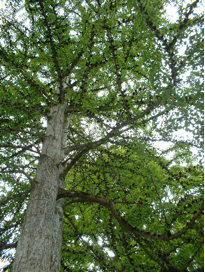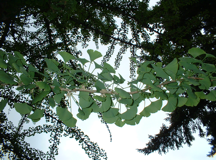The Ginko
 |
 |
 |
Tag Number: 382
Scientific Name: Ginkgo bilboa
Ginkgo is derived from Chinese characters meaning silver apricot, after the seed of the Ginkgo. Bilboa interpreted is two-lobed referring to the split in the middle of the leaves.
Common Names
- Ginkgo
- Hill Apricot
- Kew Tree
- Maidenhair Tree
- Oriental Plum Tree
- Silver Apricot
- Silver Fruit
Habitat
Believed to be a Chinese native, it has not been found growing in the wild there. It has been naturalized in the Zhejiang province of China, Washington DC, Kentucky, New Jersey, New York, North Carolina, Pennsylvania, and Virginia. It is mainly used as an ornamental tree and is resultantly planted in parks in subtropical and temperate areas around the world.
Morphology
Its leaves resemble a Chinese or Spanish fan.
Phenology
It sheds its seeds between August and November. It is pollinated between March and April.
History
These deciduous conifers are the only living specimens of the phylum Ginkgophyta. It is theorized that Ginkgos were originally grown in Temple Gardens by the Chinese, Japanese, and Koreans. The trees living today are identical to those fossilized 150 million years ago; thus, they are called living fossils. Extracts from the leaves of the Ginkgo are commonly used as dietary supplements in China, Germany, and the United States. The active ingredients within the supplements reach their peak concentrations in the fall. However, the concentrations do not get so high that taking extracts from the leaves is no longer necessary. Studies have proven that ginkgo is effective in the treatment of Alzheimer's disease, moderate memory problems, and short-term memory loss. It is also used to repair damaged heart tissues and enhance blood flow in individuals with clotting problems. However, when it is taken with aspirin or warfarin, the anti-clotting effects each drug possesses could cause severe bleeding. Although ginkgo normally has no more side effects than a placebo (sugar pill) in studies, people prone to seizures should not take ginkgo due to possible leaf extract contamination by seeds. Rarely, allergic reactions occur from the use of ginkgo.
Ethnobotany
The fleshy covering of fertilized seeds smell poorly and fall to the ground--disturbing passersby. However, when the fleshy covering is removed, the seeds are often canned and retailed in ethnic markets as silver almonds.


